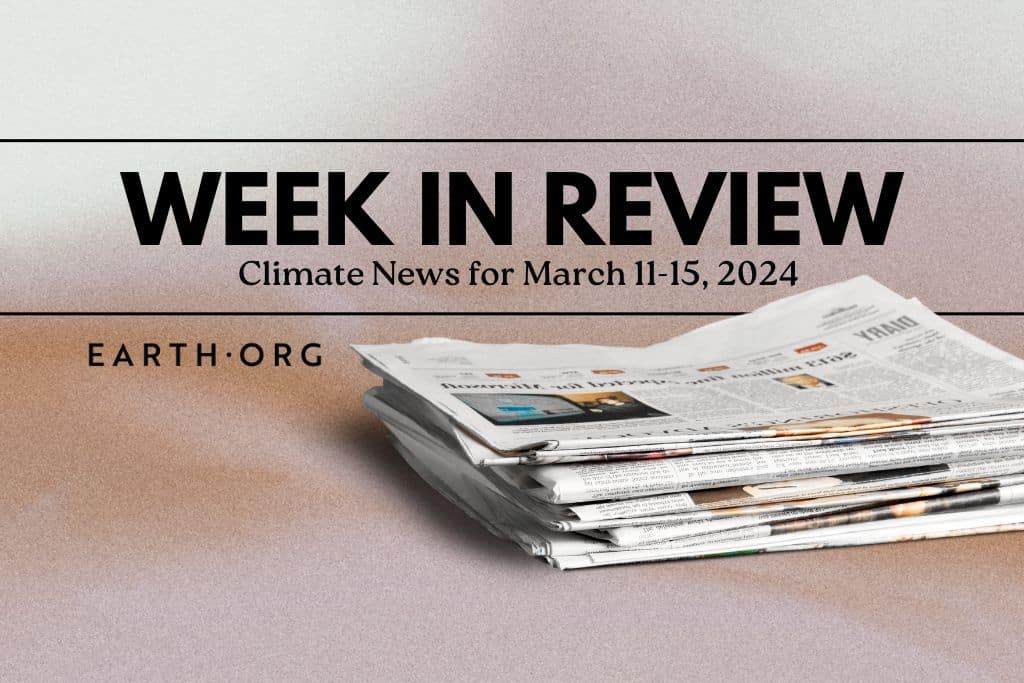This weekly round-up brings you key climate news from the past seven days, including new, watered-down EU rules for livestock pollution and a mass bleaching event affecting Australia’s Great Barrier Reef, the largest coral reef system in the world.
—
1. Australia Confirms ‘Widespread’ Bleaching Event Across Great Barrier Reef, Blames Rising Ocean Temperatures
In an update on the reef’s health issued on Friday, the authority said that aerial surveys on over 300 inshore, midshelf, and offshore reefs confirmed that “widespread, often called mass, coral bleaching event is unfolding across the Great Barrier Reef,” which covers an area of about 344,400 square kilometres (133,000 square miles) – larger than the UK and Ireland combined – off the coast of Queensland.
The reef has already undergone six mass bleaching events, four of which happened in the past eight years. The events in 2016 and 2017 were so severe that they cost the death of 50% of Australia’s iconic reef, the world’s largest and longest system, home to 400 types of coral, 1,500 species of fish, and 4,000 types of mollusk.
Read more here.
2. EU Member States Unprepared for Rapidly Growing Climate Risks Despite ‘Considerable’ Progress, Report Warns
The European Union has notoriously been at the forefront of the global fight against climate change, making significant progress in understanding, preparing for, and adapting to a multitude of imminent and already unfolding climate risks. Nevertheless, its member c
ountries are still highly unprepared for the worst consequences of a rapidly changing climate and only decisive action and rapid policy implementation at national and international level will help avoid a society-wide catastrophe by the end of the century.
“This should be the final wake-up call,” said Leena Ylä-Mononen, executive director of the European Environment Agency (EEA), which painted this grim picture in its first climate risk assessment. Published Monday, the analysis evaluates the severity of 36 climate risks threatening the continent and identifies priorities for EU-wide policy action. It predicts that without decisive action, hundreds of thousands of people could die from heatwaves and yearly economic losses from coastal floods alone could exceed €1 trillion (US$1.093 trillion).
Europe is the world’s fastest-warming continent, having warmed at a rate that is twice as much as any other continent in the world since the 1980s.
Read more here.
3. Emission-Intensive Cattle Farming Excluded From New EU Rules for Livestock Pollution
The European Parliament approved new watered-down rules to cut pollution from livestock farms and factories on Tuesday, following months-long protests by farmers who have raised concerns about their livelihoods and the future of their practice in the region.
The new industrial emission directive, approved with 393 votes in favour, 173 against, and 49 abstentions, targets pig and poultry farmers with more than 350 and 280 livestock units, respectively, tightening limits on waste disposal, water consumption, raw material use, and polluting gases such as methane and ammonia.
What raised concerns among environmentalists is the notable absence of cattle farming, which was also part of the original proposal, after a push from Bulgaria, Germany, Italy, Poland and other European countries to include fewer farms in the directive. The Commission is expected to assess the need to add cattle farming to the legislation by the end of 2026.
Read more here.
4. UK Climate Adaptation Plan ‘Lacks Pace and Ambition’, Independent Assessment Reveals
The third and latest National Adaptation Plan (NAP3), published in July 2023, “lacks sufficient scale and ambition” and “offers little in terms of significant new commitments” to support the much-needed delivery of large-scale adaptation action across the nation, the UK’s Climate Change Committee (CCC) said on Wednesday.
Under the 2008 Climate Change Act, the UK is required to produce a NAP every five years, the progress of which is assessed by the CCC every two years.
Despite being the “most developed and comprehensive” of the three NAPs, the current plan is still severely underfunded, poorly coordinated across different governmental departments, and it lacks monitoring and evaluation – all key factors to drive adequate delivery of adaptation strategies, according to the CCC. The assessment also found that most of NAP3 is based on existing policies and mechanisms, which do not reflect the urgent climate challenges and risks the country is facing.
Read more here.
5. EU Takes Greece to European Court For Failing to Comply With Bloc’s Floods Directive
In a press release published on Wednesday, the Commission said that the country, a member of the European Union (EU) since 1981, failed to finalise the revision of its river basin and flood risk management plans, which all EU member states are required to review, and if necessary update, every six years.
Under the Floods Directive, implemented in 2007, member states are required to undertake preliminary flood risk assessments for each river basin district, including mapping the district, identifying the causes of past flooding in the area, and evaluating the potential consequences of future floods on human health, the environment, cultural heritage, and economic activity.
Read more here.

















